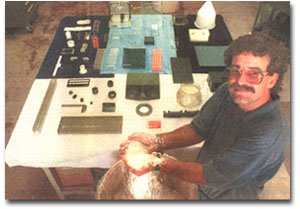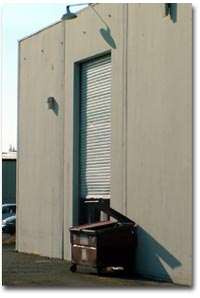|
 "I'm
just gonna say one word, Ben, just one word about your
future.... Plastics." "I'm
just gonna say one word, Ben, just one word about your
future.... Plastics."
It was 1967. Dustin Hoffman.
"The Graduate." Remember? He is floating in the
pool, recent college grad, aimless. He is getting advice
from the big E, the Establishment.
More than two decades later,
Art Frengel, a rebellious, self-described flower child
of the '60s, is trying to run his Santa Rosa plastics
fabrication company on socially responsible and environmentally
sound principles.
The irony is not lost on Frengel,
owner of the small, 16-year-old Valley Plastics.
Building a business
"People have a hard time
thinking an environmentalist runs a plastics shop. But
environmentally friendly people need to run businesses
like this," says Frengel, 39. "They have to get
into the thick of the battle, or they will lose."
Five years ago, Valley Plastics
stopped making parts for defense and nuclear contractors
and over the past few years only has taken on contracts
where the products are made out of plastics that can
be recycled.
"We started this business
when we were young," says Frengel. "As we got
older and developed a sense of responsibility we didn't
want to look back and feel guilty about what we have
done."
"I sleep well at night,"
he says.
When Valley Plastics has scrap
pieces to throw away, they go into 55-gallon drums and
are sent back to plastics manufacturers for reuse.
 "We
have the smallest Dumpster you can get," says a beaming
Frengel. He boasts that he only throws away 2 percent
of the 40 tons of plastics he uses a year. He is shooting
for 1 percent. "We
have the smallest Dumpster you can get," says a beaming
Frengel. He boasts that he only throws away 2 percent
of the 40 tons of plastics he uses a year. He is shooting
for 1 percent.
Frengel, who looks a bit like
a surfer with his curly brown hair, pony-tail length
in back, T-shirt, baggy shorts, sneakers and a beaded
bracelet on his left wrist, is a little different than
some business owners.
The first thing he talks about
is not how good his product may be, but how good his
manufacturing process is, and how much time the company
has spent weeding out the "bad" contracts and
"bad" materials.
"Businesses don't have
to be wasteful to be profitable," he says. Frengel
was on the young side of the Woodstock generation that
grew their hair long, rallied at the first Earth Day
celebrations and gave their parents a hard time about
what they were doing.
His father worked at Lockheed,
a defense contractor that was building weapons systems,
as an engineer in management. Frengel says he spared
his father no criticism.
"I used to hassle him
all the time," says Frengel. "Then I got older
and went into the plastics business. I was so caught
up in the growth of my company, I didn't even stop to
think about what my customers were doing," he says.
"One day, it may have
been my father who said: `You turned out just like me.
You are making parts for Lockheed."'
Today he is close with his
father, and looks back on those days a little sheepishly.
"It was a bit immature
of me. I was a peace-loving flower child who had blindly
started a company. I was no better than what I had been
condemning him for," says Frengel.
Frengel was only 19 when he
went into plastics, answering an ad in the newspaper
for someone with woodworking experience. Three years
and two companies later, Frengel, married and a father,
decided to start his own company.
Evil side of business
"They were tyrants and
unethical. They beat you down, promised raises, and
never gave them," he says of those other companies.
"I learned all the bad things and swore I'd never
be that way."
Business was relatively easy
then. It was the '70s in Silicon Valley, and there were
hundreds of high-tech manufacturers -- especially defense
contractors -- looking for small shops.
"It was a gold rush then,"
says Frengel. "All you had to do was put an ad
in the yellow pages."
Twice he mortgaged his house
to bail the company out, but business nevertheless grew,
mostly by repeat contracts and word of mouth.
But when housing prices started
to soar in the South Bay, and his employees could not
afford a home, Frengel looked for a place where they
could afford to buy. He moved his wife and two children,
the company and four employees to Sonoma County in 1987.
Soon, though, those long-simmering
social and ethical ideals began gnawing at him again.
"I was thinking about
doing something else. There were too many personal compromises
I had to make," says Frengel.
Guidelines for stewardship
He thought about shutting
down, going up to Oregon and making grandfather clocks.
But he had nine employees he felt a responsibility toward.
One of those, operations manager Rick Mahan, helped
the company move in a new direction.
Four years ago came a mission
statement. "We created guidelines
for good stewardship. We put into writing what we
had been doing and all the things we wanted to become.
It had to be based on principles and ethics, not profits,"
says Frengel.
Within a short period of time,
Valley Plastics cut off about 15 percent of its work,
to a few defense contractors in the South Bay. Another
15 percent was lopped off because they did not use plastics
that could be recycled.
They went from 120 customers
to 80. But 10 of those customers account for nearly
three-quarters of their work. And thanks to a boom just
beginning in medical equipment, Frengel says Valley
Plastics did not suffer.
Abbott Diagnostics in Sunnyvale
has become Valley Plastics biggest customer, and Frengel
says his company lately has been growing at about 25
percent a year.
Frengel dressed up and visited
engineers, making an effort to convince his customers
that they could make the same thing with different plastics.
Frengel says he does not bid
work for a company that he thinks might not pay the
bills. "I can't afford to get stuck with $40,000
worth of inventory," he says.
The standards of Valley Plastics
have obviously kept it a small company, with $800,000
in annual revenues and 11 employees who work a 40-hour
work week in four days to cut down on commuting.
"I believe you create
your own destiny. Maybe we could be a $2 million company.
Maybe we'd be bigger. But I could not have had these
ideals," says Frengel.
*Since the publication of this article, Valley Plastics
has over doubled in size- and no, we haven't compromized
those ideals.
|